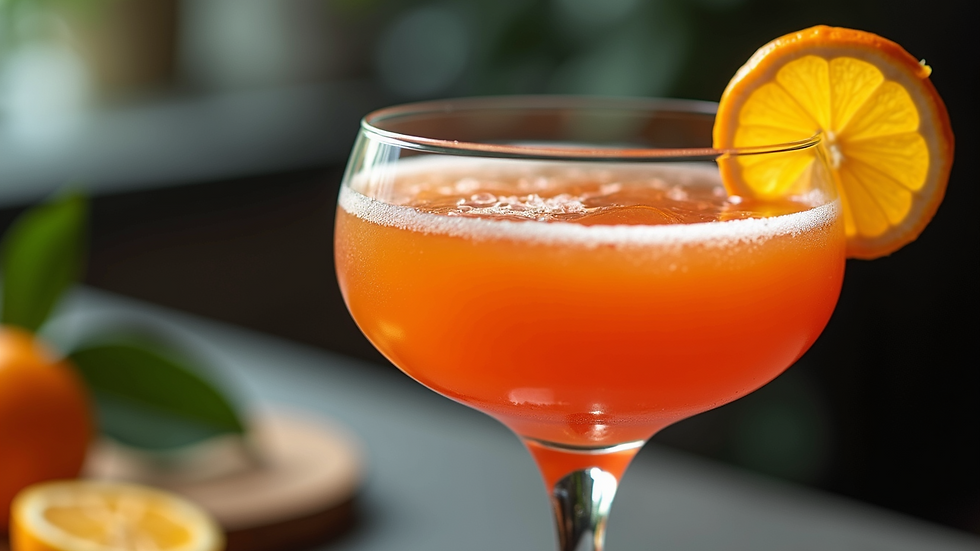The Art of Crafting the Perfect Cocktail
- The Royal Standard

- Sep 2, 2025
- 4 min read
Crafting the perfect cocktail is both an art and a science. It requires a balance of flavors, an understanding of ingredients, and a touch of creativity. Whether you are a beginner or an enthusiast looking to refine your skills, mastering mixology can elevate your drinking experience and impress your guests. This guide will walk you through the essential elements of cocktail making, from understanding the basics to exploring advanced techniques.
Understanding Mixology: The Foundation of Great Cocktails
Mixology is the study and craft of mixing drinks. It goes beyond simply combining ingredients; it involves knowing how flavors interact, the history behind classic cocktails, and the techniques that bring out the best in each component.
Key Ingredients in Mixology
Base Spirits: Vodka, gin, rum, tequila, whiskey, and brandy form the backbone of most cocktails.
Modifiers: These include liqueurs, bitters, and syrups that add complexity and depth.
Mixers: Juices, soda, tonic water, and other non-alcoholic liquids that balance the drink.
Garnishes: Citrus twists, herbs, and fruits that enhance aroma and presentation.
Essential Tools for Cocktail Crafting
Shaker
Strainer
Jigger (for precise measurements)
Muddler
Bar spoon
Mixing glass
Mastering the use of these tools is crucial for consistency and quality.

Techniques to Know
Shaking: Used for cocktails with juices or creamy ingredients.
Stirring: Ideal for spirit-forward drinks like martinis.
Muddling: Crushing herbs or fruits to release flavors.
Layering: Creating visually appealing drinks with distinct layers.
Understanding when and how to use these techniques will help you craft cocktails that taste as good as they look.
Elevating Your Mixology Skills with Creativity and Precision
Once you have the basics down, it’s time to experiment and personalize your cocktails. Creativity in mixology means playing with flavors, textures, and presentation.
Flavor Balancing
A great cocktail balances the five basic tastes: sweet, sour, bitter, salty, and umami. For example, a classic margarita balances the tartness of lime with the sweetness of triple sec and the bite of tequila.
Experimenting with Ingredients
Try infusing spirits with herbs or fruits.
Use homemade syrups like lavender or ginger.
Incorporate unusual bitters or liqueurs for unique twists.
Presentation Matters
Use fresh garnishes.
Choose the right glassware.
Consider the color and layering of the drink.
These details enhance the overall experience and make your cocktails memorable.

Learning from Professionals
If you want to take your skills further, consider consulting experts who specialize in bar services. They can provide personalized advice, training, and even help design cocktail menus for events.
How much does a bar service cost?
When planning an event or looking to elevate your home bartending experience, understanding the cost of professional bar services is important. Prices vary depending on the type of service, location, and level of customization.
Factors Influencing Cost
Type of Event: Weddings, corporate events, or private parties may have different pricing structures.
Number of Guests: More guests typically mean higher costs.
Service Level: Full-service bars with professional bartenders cost more than simple setups.
Customization: Specialty cocktails, unique ingredients, and themed menus can increase the price.
Typical Price Ranges
Basic bar service: $300 - $600 for small gatherings.
Full-service bar with bartenders: $800 - $2,000 depending on event size.
Premium or custom cocktail services: $2,000+ for large or high-end events.
Tips to Manage Costs
Choose a limited cocktail menu.
Opt for signature drinks instead of a full bar.
Rent glassware and equipment instead of buying.
Understanding these factors helps you budget effectively while ensuring your guests enjoy expertly crafted drinks.

Tips for Crafting Cocktails at Home Like a Pro
You don’t need a professional setup to make great cocktails. With a few tips, you can impress friends and family with your mixology skills.
Stock Your Home Bar Wisely
Start with versatile spirits like vodka, gin, and rum.
Keep essential mixers like tonic, soda, and citrus juices.
Have basic tools like a shaker, jigger, and strainer.
Follow Recipes but Don’t Be Afraid to Improvise
Use trusted recipes as a guide.
Adjust sweetness or sourness to your taste.
Experiment with garnishes and presentation.
Practice Makes Perfect
Try making one new cocktail each week.
Taste and tweak your recipes.
Learn from mistakes and keep notes.
Keep It Fresh
Use fresh ingredients whenever possible.
Avoid pre-made mixes that contain artificial flavors.
By following these tips, you can enjoy the art of mixology in the comfort of your home.
Exploring the World of Cocktails: Beyond the Basics
The world of cocktails is vast and exciting. Once you master the classics, you can explore regional specialties, historical recipes, and modern innovations.
Classic Cocktails to Know
Martini
Old Fashioned
Negroni
Mojito
Margarita
Regional and Cultural Variations
Japanese highballs
Mexican mezcal cocktails
Caribbean rum punches
Italian aperitivos
Modern Trends in Mixology
Low-alcohol and no-alcohol cocktails
Sustainable and locally sourced ingredients
Molecular mixology techniques
Exploring these areas will deepen your appreciation and skill in cocktail crafting.

Final Thoughts on Perfecting Your Cocktail Craft
Crafting the perfect cocktail is a rewarding journey that combines knowledge, skill, and creativity. Whether you are mixing drinks for yourself, friends, or a special event, understanding the principles of mixology will help you create beverages that delight the senses. Remember to experiment, learn from professionals, and most importantly, enjoy the process of making and sharing great cocktails.




Comments